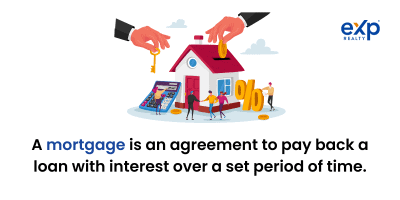As you look into closing on a home, you’ll have multiple points to consider. For example, if you meet the underwriting conditions, you could receive the clear to close status, indicating you can start buying the home and finishing the details to make it your own.
Since loan applications can quickly become stressful, you’ll naturally wonder what clear to close means. Ensure you understand the mortgage process, what clear to close means, and similar details to help you work through the loan terms and even seek help from a local agent, brokers, or even a real estate attorney.
Understanding the Mortgage Process
Before you can understand clear to close, you must understand mortgage loans and the process, which involves a few crucial steps.
- Contacting mortgage companies
- Providing the requested details
- Receiving an estimate from them
Since the mortgage application takes time and requires multiple details, you should go through it quickly and alongside your real estate agent. You’ll then discover your buying power, allowing you to search for homes based on conditional approval.
Remember that the mortgage process gives you an estimate, so you should provide yourself with wiggle room.
The Required Mortgage Documents
Before you can get the green light for your mortgage, you must meet various funding conditions, so you’ll need to prove you meet them by submitting some required documents.
- Proof of income
- Plan for your down payment
- Asset documentation
- Debts, financial history, etc.
- Special circumstances
Above all else, you’ll need to show your proof of income if you want to get a mortgage. These can include your annual income through pay stubs, tax forms, and similar documents. You can ask the lending team for details on what you should submit for proof of payment.
You may need to present a plan for your down payment. Most homes require a minimum down payment, so ensure you cover that in your costs. You should also submit proof of assets that boost your value, such as previous homes or similar details.
The current conditions also depend on your financial history alongside any debts. For example, they may look at your credit card and bank statements to ensure you pay your bills on time. The same applies to other payments, such as rent, vehicle loans, or anything else.
You must consider other details, such as alimony income, lines of credit, social security, and similar financial documents. Once you provide everything, the underwriter will check the documents, see where you fall, and approve the loan based on the situation.
What Does “Clear to Close” Mean?
Clear to close means you met the conditions of the loan as approved by the underwriter. Since you met those conditions, you can receive a document verifying them, allowing you to apply for homes based on the approval.
The clear to close status matters since it indicates you can receive approval for the loan status. The homeowners know you can afford the home, especially as you have closing disclosures to prove your status.
Once you receive the clear to close status, others know the underwriter approved your situation since they went through the loan files and your loan request. While you may still need loan processing, you can prove to buyers you have everything required for a set loan amount.
With that in mind, you can present the information proving your loan applications so homeowners know you’re serious about purchasing a home. They then become more willing to sell the house to you, though it can vary based on the type of loan.
What Happens After “Clear to Close”?
As you seek loan funds and receive a clear to close, you can work with real estate professionals to get a house. You do so by going through the closing process for a home, allowing you to address the closing table and prepare for the day of closing.
As you approach the clear to close status, you have multiple steps to tackle.
- Picking a closing company
- Signing the closing document
- Signing the loan
You must start by working with a closing company that’ll assign you a closing agent. You may need to speak with a closing attorney to work through the process and ensure you do it correctly. Doing so will ensure you cover the necessary steps as you approach the closing day.
You’ll need to sign the closing document while working with the closing company. Doing so will finalize the home details and terms. That means you’ll need to pay the closing costs, so you should have a closing attorney review the details before you sign it.
You then must sign a loan agreement, which may require you to work with your loan officer. After you sign the documents, you must pay toward your mortgage while covering any additional debt.
Reviewing the Closing Documents
Keep in mind it doesn’t stop there: the underwriter and potentially your loan officer must review the closing documents. They must see the final amount you plan to pay, verify any additional documents, and give you the loan disclosures.
They must verify your credit score, credit history, and verification of employment. They’ll also look through the closing documents to see the exact amount they must lend you. Since outstanding conditions can adjust the amount, they need to know how much you need.
For example, if you need to make a down payment, you must prove it through your bank accounts, checks, and similar forms of money. They can look through your financial profile, the closing day details, and go through with the loan request.
Factors That Might Delay “Clear to Close” Status
As you seek mortgage approval and the perfect time to apply, you have multiple factors that could delay your clear to close status. Ensure you know those points, so you’ll avoid them and seek a home.
- Inconsistencies and discrepancies in documents
- Lacking the required documents
- Changes to your financial situation
- Issues with the closing disclosure
As you go through the process, you must focus on accuracy. Do your best to present the information correctly and avoid any misunderstandings. Otherwise, the underwriter will come across those problems and request changes to make it consistent.
The same applies for all the required documents, so check what you need before you start. You should also remain honest about your financial situation. That means if you lose your job or anything else changes, you should let the lender know.
You may even notice issues with the closing disclosure once you receive it, so double-check it before you start searching. Otherwise, you could face more issues later on if the disclosure doesn’t match what you plan for your mortgage.
Tips for Achieving “Clear to Close” Status
As you look into home purchase loans, you must understand how to reach the status. If you want to achieve the status and go through the funding conditions, you must follow some tips to gain that status and work toward the day of closing.
Gather the Documents Beforehand
Since the underwriter will need the documents anyway, you may look up what you need and prepare them. For example, you’ll want to give them your tax return, so they can check how much money you make in a year, with some lenders wanting two years of returns.
Remain Honest During the Application
Never try to lie or trick the company while you work with them. They’ll likely get the information from multiple sources and confirm it, meaning you shouldn’t try to inflate your numbers. Doing so can give you a mortgage you can’t afford, leading to problems for everyone involved.
Respond Promptly to Requests
While you go through the process, your lender and underwriter may seek information. Ensure you respond to them quickly and provide the details immediately, so they’ll have everything necessary to give you the clear to close status.
Avoid Major Purchases
As you prepare to buy a home, you may purchase large items, such as furniture or beds. You should hold off until you receive your approval since doing so can prevent you from getting the loan when the lenders see a sudden bulk payment from your accounts.
Prepare a Down Payment
If you want to become clear to close, you should prepare a down payment. Doing so means getting some cash to help you with the down payment, so you won’t have to pull it out of your account (unless, of course, you’re buying the home with cash).
If you can get a high enough percentage for a down payment, you won’t have to pull as large of a loan, getting you more approvals.
Key Takeaways
If you want the mortgage process to go smoothly, you must understand the clear to close status. The mortgage process involves working with mortgage companies, presenting the correct documents, and seeing what you must change to receive approval.
Once you receive the clear to close status and get any closing disclosures you need, you can work with the home seller to close on the home. You’ll then start paying your mortgage and secure a title, potentially with a licensed title agency.
However, you may face delays with the status, so ensure you work with your loan officer and become potential customers through your application. You’ll need to utilize tips to go through the process smoothly, so review them before you start.
As you use key ideas & takeaways, you’ll work toward the closing status while working through the underwriting process. Ensure you review the crucial steps to achieve the status.
- Work with the mortgage company
- Send all the required documents
- Meet their requests
- Wait to see your approved amount
- Secure a home
- Work toward closing day
- Sign on the house and loan
FAQs
After you work with a loan officer and get through clear to close, you can go through the frequently asked questions (FAQs) section. Doing so will help you understand the process further and finish it, so you can sell or buy a home with minimal problems.
What happens at clear to close?
Clear to close happens once you receive approval from the underwriter to get the loan amount. If you have it set in stone and it covers the home, you can go through the final steps with the seller. You can also reassure the seller you have the money to start closing.
How long does it take from clear to close to actual closing?
The length varies based on how fast you go through the contract and other details. The closing process can be as short as a few weeks, but it could take multiple months, based on the circumstance. Either way, you shouldn’t rush through it to protect both sides.
Is clear to close final approval?
No, it’s not final approval since different aspects of your life, such as employment status, can change. Most mortgage lenders will require you to verify the information before you close on the home, so they know you can still pay for it.
Is clear to close the same as closing disclosure?
Clear to close and closing disclosure have distinct differences. Clear to close means the underwriter gave you conditional loan approval. Closing disclosure refers to the loan document you receive detailing the loan, your payments, and further information.
Does the underwriter give the clear to close?
The underwriter indicates they reviewed all the documents and verified your income, credit report, and other information. While you may not hear the clear to close directly from them, you can receive an update, allowing you to start your search with a set loan amount.
Can a mortgage fall through after clear to close?
Yes, a mortgage can fall through even after you receive the clear to close. Since loan officers and others will verify the information before you close on the house, they’ll know if something changes. Also, interest rates fluctuate, which can impact your financial situation.
What do lenders check right before closing?
The lender will check your closing costs, additional fees, and changes in mortgages and interest rates. You can expect the amount to vary by the time you close, so don’t be surprised by any changes since closing disclosures offer estimates.
What happens after clear to close?
Once you receive your clear to close, you can seek the closing documents from the seller. You’ll go through the contracts, agree, and work with a title company. While you may need title insurance, you can finish the real estate transactions and closing process.










